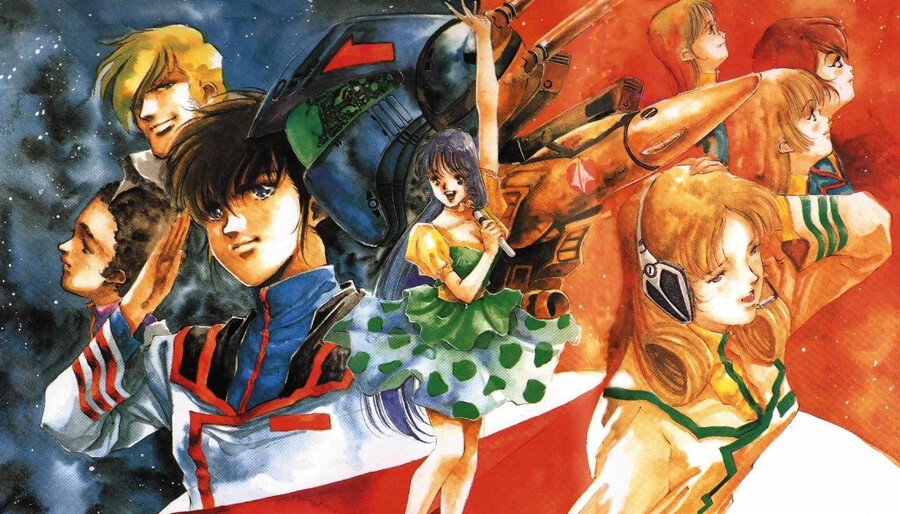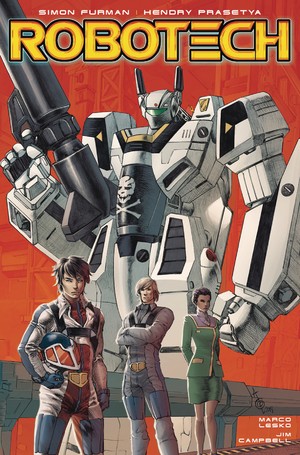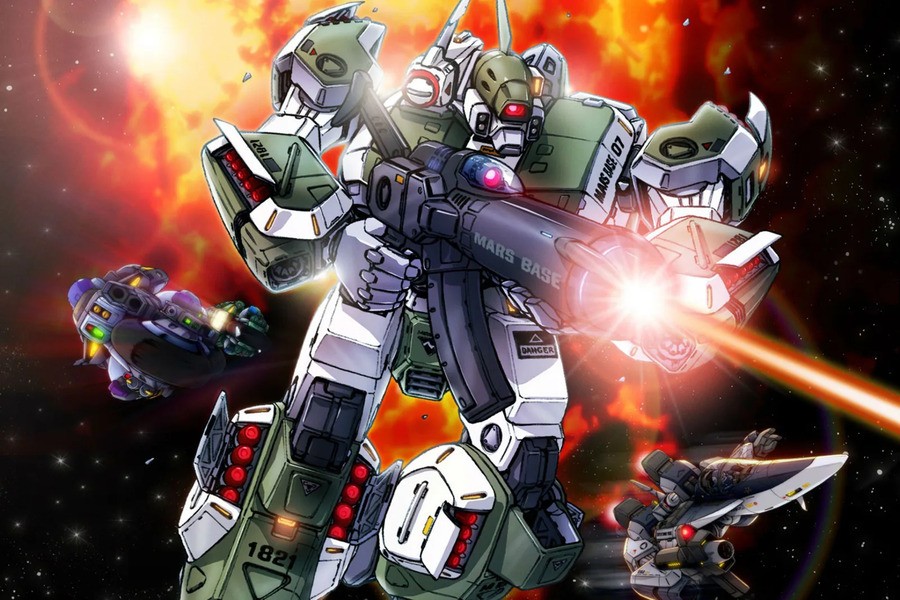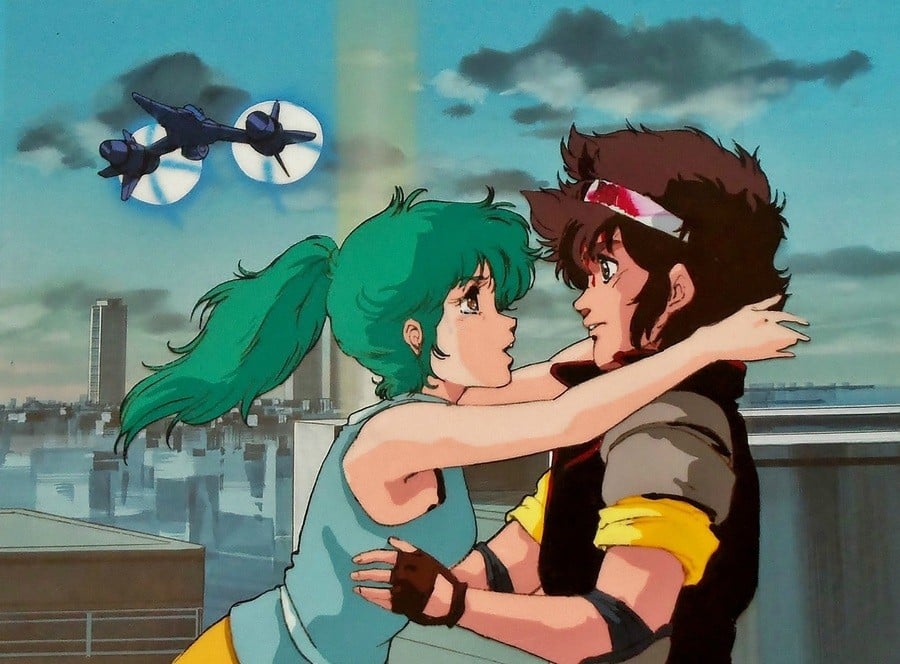
Robotech is a name that will be familiar to anyone who was lucky enough to have grown up during the '80s, and is, for many people, their first introduction to the world of Japanese animation (or anime).
Since the first series aired in 1985, it has been an ongoing concern for IP holder Harmony Gold USA, and we've seen new productions, comic books, associated merchandise and (of course) video games – including 2002's Robotech: Battlecry, 2004's Robotech: Invasion and the (sadly cancelled) N64 title, Crystal Dreams.
However, despite its enduring fame, Robotech often elicits an adverse reaction from some sectors of anime fandom, largely because it's not really a 'proper' series at all, but a Frankenstein's monster created by fusing three different Japanese shows – Super Dimension Fortress Macross, Super Dimension Cavalry Southern Cross and Genesis Climber MOSPEADA – in order to hit the required number of episodes for syndication in North America.
The man behind the Robotech TV series is Carl Macek, who sadly passed away from a heart attack in 2010 at the age of 58. 1985's Robotech was the series that brought Macek to the public's attention; he served as producer for Harmony Gold and was also the main scriptwriter. He also worked on a cancelled series sequel, Robotech II: The Sentinels, and an adaptation of Space Pirate Captain Harlock and Queen Millennia, called Captain Harlock and the Queen of a Thousand Years, during his time with Harmony Gold. A Robotech movie was also released in 1986, and this combined footage from Megazone 23 Part I and Super Dimension Cavalry Southern Cross and had only a very limited cinema release.

Macek's work on splicing together unrelated Japanese anime continues to earn him the ire of fans, even more than a decade after his tragic death, but he was arguably instrumental in making anime the mainstream proposition it is today in the west.
Outside of Robotech, which turned an entire generation onto Japanese animation, he also co-founded Streamline Pictures in 1988, one of the first American companies to bring anime to western audiences. Streamline would localise the likes of Lensman, Crying Freeman, Wicked City, the 1986 Fist of the North Star movie, Lupin III: Castle of Cagliostro, Laputa: Castle in the Sky, My Neighbor Totoro, and Kiki's Delivery Service – as well as Akira, one of the most important and influential anime movies of all time.
I was lucky enough to speak to Macek in 2009 for SFX magazine, a year before he died. The full, unedited interview – which is focused primarily on Robotech but also pulls in other elements of his career – can be found below.
What work were you involved in prior to becoming involved with Harmony Gold and Robotech?
Carl Macek: I wore many hats – I owned comic book stores (some of the first brick-and-mortar operations in the States in the 1970s). I was also the curator of the archive of popular culture at Cal State University, Fullerton. I was a journalist and had written or co-authored several books on movies and popular culture. I also worked in the motion picture industry as a marketing and promotional coordinator and speciality marketer from the late seventies on films like Star Wars, Aliens [and] Dune.
How did you come to work on Robotech?
Carl Macek: In 1984 I owned an animation art gallery/comic book speciality retail store in Southern California, and a representative from Harmony Gold came in one day requesting cels from some esoteric anime titles I had in my inventory. He said it was easier to get the images from my store rather than request material from Japan. Upon questioning him further, I asked what other titles they had the rights to – he mentioned Macross. I asked if his company had merchandising rights to Macross. He said he would have to get back to me on that question.
A few hours later, he called from his office in Hollywood, CA, saying that his company had the merchandising rights to Macross – but had no real plans on marketing the series at this time. I asked if I could get a commission for selling off some of these rights – we came to an agreement, and I began working on licensing Macross in the states – the first thing I did was get a comic book deal from Comico. When I came to their office with the signed contract and a check for the advance, I was introduced to the owner of the company, who asked me what I knew about the series. I told him it was a very popular series in Japan – and because I owned comic book stories, I was importing model kits and other merchandise from Japan and had learned how popular this particular series was. I offered to produce an English language version of Macross for them for home video – they agreed.
The adaptation was relatively straightforward – consisting of the first few episodes – the only major difference was in the names of a few of the characters. The subsequent sales through the speciality retail market and through per enquiry ads with Heavy Metal magazine proved to be a success. It was screened to great success at the annual Science Fiction Convention held in Los Angeles in 1984.
How was the model firm Revell involved with the series?
Carl Macek: Unknown to me at the time, Revell was in talks with Harmony Gold regarding their line of imported model kits, which they were marketing under the Robotech banner. They had gone to a toy fair in Japan and licensed the rights to a number of model kits from a variety of licensed properties – their marketing strategy was to create a brand name for these kits with Robotech.
Revell had already done a deal to make comics with DC, but since a number of their more successful kits came from the Macross series, it was only natural that they would seek further means of positioning their product line – and since Harmony Gold had the merchandising rights to Macross it was only a matter of time until they worked together.
Harmony Gold eventually hired me to head up the development of a potential television series called Robotech. I worked with both Revell and Harmony Gold executives to come up with a viable plan. At this time, the animation market was dominated by syndicated television series like He-Man and the Masters of the Universe and Thunder Cats – scheduled to be played Monday through Friday for a thirteen-week cycle. Macross only had 36 episodes – and I suggested that if we were going to be taken seriously we would have to add more episodes. I was asked to search through the HG library and determined that two other series – Southern Cross and Mospeada – could possibly be woven into the Macross 'universe'.
I informed everyone that this would require a radical reimagining of the plot. I was given the green light, and production began. Eventually, it all became too much for Revell – a model kit company had never sponsored an animated series before – and they were 'bought out' by HG. Revell became a licensee instead of a principal.
What was it like working under Harmony Gold? Did the company interfere much with your work, or were you given a degree of freedom?
Carl Macek: Since HG was primarily a sales organization, I was given total freedom by HG to pursue my creative instincts – an unusual situation which resulted in the work that survives to this day.
Why did you opt to create an entirely new story for Robotech instead of merely translating a single Japanese anime series (such as Macross) into English?
Carl Macek: We were looking for a unifying storyline – had we just adapted each series individually, it would not have had the same impact. After reviewing hundreds of hours of anime, I came to the conclusion that the three series selected for Robotech could would together to tell an amazing three-act story. Also, there were some elements in the series which I felt were too esoteric for the American audience – such as the fear of culture (AKA 'Music') experienced by the Zentradi.
Fusing footage from three different anime productions to form a coherent storyline must have been an incredibly daunting task – what was the most difficult aspect of this process?
Carl Macek: The process was unique – I locked myself up in a screening room and watched the footage from the three series with the sound turned off. I was looking for visual patterns or similarities – I was trying to get the right sequence of events to tell the story. Eventually, I chose to start with Macross, then segue into Southern Cross and eventually conclude with Mospeada – this was not the chronological order in which the series were originally produced.
How long did it take to rewrite the story, edit the footage and record all the new dialogue?
Carl Macek: Everything was done simultaneously approximately over a four-month period. We had several studios recording dialogue in both day and night shifts. There was a staff of ADR (automated dialogue replacement) writers who would work off my outlines. I would be editing [an] episode in one room and coming in to see the mix in another – it was a whirlwind. I am surprised that it came together as well as it did.
Were there any particular plot points present in the original Japanese anime that caused problems or had to be written out?

Carl Macek: The Robotech Protoculture storyline changed a great deal of the original plot points. Although subtle changes were made in Macross, the biggest was the use of protoculture; in Macross, it was an intellectual concept, but in Robotech, it was a remarkable energy source. As we wove the other stories into the mix, the Robotech storyline took precedence – Southern Cross was the most altered, [and] for Mospeada, we needed to restructure the reason for the Invid coming to Earth.
In terms of visuals, Southern Cross was not set on Earth originally and all the visual references to the planet, which had two moons, had to be visually altered.
Do you have any amusing anecdotes from the recording period?
Carl Macek: The original anime producers came to visit us in Hollywood to monitor our progress. They were shocked that we were able to get the spoken words to match the mouth movements. Sometimes writers or actors would give alternative lines of dialogue just to break the boredom – these lines would be recorded and then played back just for laughs. One such line spoken by Rand [Frank Catalano] – 'Get a job' – managed to get into the final mix because the engineer failed to erase the alternative take, and the mixer chose to include it over the actual line.
Charles Fleischer, an incredibly gifted actor (he was the voice of Roger Rabbit) worked on many of the 'walla' sessions [sound effects imitating the murmur of a crowd in the background] for Robotech – this was the time when we would do bit parts and crowds. Between takes, Fleischer – an accomplished stand-up comedian – would go try out his latest comedy bits which would crack everyone up and cause the production to slow down. Eventually, we had to let Charles go.
What is it like working with voice actors as opposed to traditional 'live' actors?
Carl Macek: Voice actors are a special breed. And for this project – the first major single-tracked project (one actor at a time) – it required people with skills far different from other actors.
For example, the first actor for a scene had to act alone – creating timing, emotion and content without the benefit of playing off another actor. As the production progressed the subsequent actors were able to play off previously recorded tracks. It is remarkable with the tools available to us at the time that we were able to make the acting seem fresh and natural. It couldn’t have happened without good actors, good scripts and good directing.
Japanese animation is known for featuring mature themes such as sex and violence. Did you have to edit out anything from the original anime in order to confirm with US TV rating standards?
Carl Macek: Robotech was scheduled to be broadcast on NBC on Saturday mornings, and so we were compelled to go by the NBC standards and practices guidelines. We were required to eliminate any nudity and visuals which showed blood flowing from wounds to human bodies.

For many people (myself included), Robotech was their first exposure to Japanese animation and is arguably one of the most important factors in the media becoming popular in the US, and consequently, worldwide. How does it feel to know you’ve had such a significant influence on the popularity of anime in the West?
Carl Macek: It is bittersweet. It was not an easy road – more like a rollercoaster ride. Following the initial rush of the success of Robotech, for many years, I was criticized and berated for changing the storyline of the original anime by a group of hardcore anime fans.
How does it make you feel to be attacked for 'ruining' these series?
Carl Macek: My point is that more people around the world have seen the remarkable work presented in these various series as Robotech than as the original series. A final vindication came a few years ago when ADV produced an English-language version of Macross, and the results were lukewarm.
It seems like a lifetime ago, but I can understand the reaction of the hardcore fan – but had Robotech been done as three different shows without the multigenerational hook, anime culture might not be at the level it is today.
What was the deal with Robotech II: The Sentinels? Is it true that this was going to be a 100% original production? Why was it cancelled?
Carl Macek: It was indeed an original production. A co-production between Harmony Gold, Tatsunoko and Matchbox Toys. It had been sold to a syndication network covering over 65% of all American households. All 65 scripts were written, and production had begun. Problems began cropping up regarding money, and eventually, Matchbox pulled out of the production. We were able to salvage enough footage to create a feature-length movie.
Robotech: The Movie was another case of taking an existing anime and tinkering with the story to make it tie-in with the Robotech universe. However, you’ve been very dismissive of the film – do you think it was a mistake to produce it?

Carl Macek: I enjoyed the process of working on the film – it was a great learning experience. Originally, we tried to acquire the rights to Macross: Do You Remember Love, but the rights were tied up. Then we move on to Megazone 23 pt. 1, which we would use to tell the story of what happened on earth when the SDF-1 was in space. It was to end with the SDF-1 coming back to earth – utilizing footage from Macross.
While I was in Japan working on the Sentinels, the distribution company set to release Robotech: The Movie screened an incomplete version of it and rejected it. I was called back to the states and was asked to recut the film. I did this by adding more action footage from Southern Cross and changing the storyline to be a secret invasion by the Robotech Masters. The science fiction was good, but up on the big screen, the inclusion of so much 16mm footage blown up to 35mm looked weak and amateurish – it probably looks better on home video.
I seriously doubt that it will ever get a proper video release in the States. I also enjoyed working on the original animation at the end. We brought in a storyboard artist who worked on the Mad Max films to do the boards from my script. It was quite an experience.
What happened to the CGI Robotech 3000 series and why was it cancelled?
Carl Macek: Too expensive. It would have been a great story – answering all the lingering questions posed by the Robotech storyline. Much of the design work was non-anime-oriented and looked weird.
Have you been involved with recent Robotech productions, such as The Shadow Chronicles? What is your opinion of the more recent expansions of the storyline?
Carl Macek: Not in any significant capacity – just as a sounding block and to answer technical questions.
Have you had any involvement with the proposed live-action Robotech movie?
Carl Macek: Not to this point, but I hope to once the production gets into full swing. [Editor's note: the Robotech movie remains unproduced more than a decade after this interview took place, but this year there were promising signs that it is finally moving forward.]
Despite the fact that the original series of Robotech was based on footage from other productions, the brand has gone on to spawn sequels, spin-off movies, books, toys and video games, and even today, it shows little sign of losing its appeal. Does this enduring success surprise you, or were you aware that you were onto something special back then?
Carl Macek: What is funny is that Harmony Gold had a party after Codename: Robotech aired on a local LA television station back in 1985. I went over to Frank Agrama, the owner of Harmony Gold, and told him that I thought that fans would be talking about this series for years to come. Mr. Agrama smiled and offered me a drink. To some, it would have been considered just party talk, but because of my experience in the industry, I felt that we had hit just the right balance of adventure, drama and raw excitement that would stand the test of time. However, I never thought it would go as far as it did.
In 2021, a dispute between Macross IP owner Big West and Harmony Gold was finally settled, paving the way for the pair to work together on the global distribution of both franchises. Macek sadly never got to see the resolution of this long-running legal battle, but the fact that Robotech is continuing to find new fans is a testament to the legacy of his work – even if some anime fans still look down on it, 12 years after his passing.
